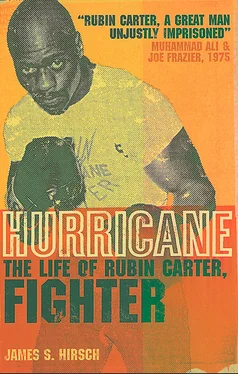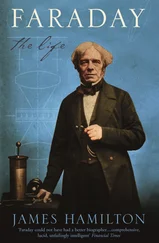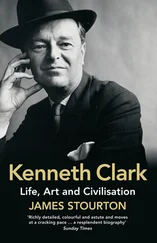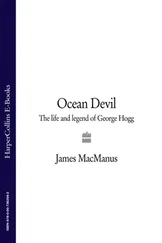Carter concealed his drinking as much as possible. It was a sign of weakness and undermined his image as an athletic demigod. To avoid drinking in clubs, he picked up liquor in stores and drank in his car, sometimes with drinking buddies, sometimes alone. He tried not to order more than one drink at any one club on a given night. His wife rarely saw him imbibe and had no idea of the scope of his addiction. He carried Certs and peppermint candies to mask the alcohol on his breath, and he never got staggering drunk.
While Carter was a dedicated night owl, he was also a celebrity loner whose ready scowl stirred fear in bystanders, and he shunned close personal ties. He was often silent and moody, and many blacks in Paterson viewed him with a mixture of respect, envy, and fear. “Everybody loved Rubin, but no one was his friend,” said Tariq Darby, a heavyweight boxer from New Jersey in the 1960s. “I remember seeing him once in that black and silver Cadillac. He just turned and gave me that nasty look.”
Tensions were more overt between Carter and Paterson’s white majority as he flaunted his success in ways that he knew would tweak the establishment. He owned a twenty-six-foot fishing boat with a double Chrysler engine, which was docked at a marina in central New Jersey. He owned a horse, a once-wild mare he named Bitch, and rode in flamboyant style on Garrett Mountain. Dressed in a fringed jean jacket, a ten-gallon hat, and spur-tipped boots, Carter was hard to miss passing the white families picnicking on the hillside, and he didn’t mind when his riding partner was a white woman.
Carter’s shaved head, at least twenty-five years before bald pates became a common fashion statement among African Americans, had its own political edge. In the early 1960s, many blacks used lye-based chemical processors to straighten their curls and make their hair look “white.” White was cool. But Carter’s coal-black cupola sent a message: he had no interest in emulating white people. In fact, he shaved his head in part to mimic another glabrous black boxer, Jack Johnson, who won the heavyweight title in 1908 but was reviled as an insolent parvenu who drove fancy cars, drank expensive wines through straws, consorted with white women, and defied the establishment.
Carter’s showy displays jarred white Patersonians, who had a very different model for how a black professional athlete should act. They cherished Larry Doby, a hometown hero and baseball pioneer. On July 5, 1947, Doby joined the Cleveland Indians, breaking the color barrier in the American League. He was the second black major league player, following Jackie Robinson by eleven weeks. This feat spoke well of Doby’s hometown, Paterson, and Doby seemed to always speak well of the city. Never mind that Doby, who grew up literally on the wrong side of the Susquehanna Railroad tracks, knew well the racism of Paterson. As a kid going to a movie or vaudeville show at the Majestic Theater, he had to sit in the third balcony, known as “nigger heaven,” and he could not walk through white sections of Paterson at night without being stopped by police. Even after he became a baseball star, Doby was thwarted by real estate brokers from buying a home in the fashionable East Side of Paterson. He eventually moved his family to an integrated neighborhood in the more enlightened New Jersey city of Montclair.
But in public Doby was always a paragon of humility and deference. After he helped the Indians win the World Series in 1948, he was feted in Paterson with a motorcade. A crowd of three thousand gathered at Bauerle Field in front of Eastside High School, his alma mater, and city dignitaries gave effusive speeches about a black man whose deeds brought glory to their town. Then Doby took the microphone: he thanked the mayor and his teachers and coaches, concluding with these words: “I know I’m not a perfect gentleman, but I always try to be one.”
No white authority figure in Paterson ever called Rubin Carter a gentleman, perfect or otherwise. He was viewed not simply as brash and disrespectful but as a threat. Bad enough that he could knock down a horse with a single punch. Carter also owned guns, lots of them—shotguns, rifles, and pistols. He learned to shoot as a boy, practicing on a south New Jersey farm owned by his grandfather, and he honed his skills as a paratrooper for the 11th Airborne in the U.S. Army. He used his guns mostly for target practice but also for hunting, roaming the New Jersey woodlands with his father’s coon dogs. Carter could nail a treebound raccoon right between the eyes. He also owned guns for protection, and he had some of his suits tailored wide around the breast to accommodate a holster and pistol, which he would wear when he feared for his safety.
Like Malcolm X, Carter advocated that blacks use whatever means necessary, including violence, to protect themselves. He participated in the March on Washington in 1963, but two years later he rebuffed Martin Luther King, Jr.’s request to join a demonstration in Selma, Alabama. Carter knew he would not, could not, sit idly in the face of brutal attacks from law enforcement officials, white supremacists, or snarling dogs. “No, I can’t go down there,” he told King. “That would be foolishness at the risk of suicide. Those people would kill me dead.”
Carter did not accept the mainstream civil rights approach of passive resistance. He believed the sacrifices that blacks were making, whether on the riot-torn streets of Harlem or in the bombed-out churches of Birmingham, were unacceptable. Malcolm X had been killed. So too had James Chaney, Andrew Goodman, and Michael Schwerner, three young civil rights workers, Medgar Evers, a black civil rights leader, and others unknown. Nonviolence is Gandhi’s principle, but Gandhi does not know the enemy , Carter thought.
When under attack, Rubin Carter believed in fighting back; in his view it was the police who were usually doing the attacking. But his many scrapes with the cops, plus some intemperate comments to a reporter, gave the authorities reason to believe that he was able, even likely, to commit a heinous crime.
In addition to the assault and robbery conviction in 1957, Carter, at fourteen, and three other boys attacked a Paterson man at a swimming hole called Tubbs near Passaic Falls. The man was cut with a soda water bottle and his $55 watch was stolen. Carter was sentenced to the Jamesburg State Home for Boys, but he escaped two years later. In the 1960s, his fracases with the police were common. In one incident, on January 16, 1964, a white officer picked him up after his Eldorado had broken down on a highway next to a meatpacking factory near Hackensack, New Jersey. He was driven to the town’s police headquarters, then accused of burglarizing the factory during the night. He had been locked in a holding cell for four hours when a black officer arrived and recognized him. “Is that you in there, Carter? What the hell did you get busted for, man?” Carter let out a stream of invective about the cops’ oppressive behavior. He was finally released after the black officer demanded to know the grounds on which he was being held. According to the official record, Carter had been arrested as a “disorderly person” for his “failure to give good account,” and the charge against him was dismissed.
Hostilities between Carter and the police, in New Jersey and elsewhere, escalated to a whole other level after a Saturday Evening Post article was published in October 1964. The story was a curtain raiser for the upcoming middleweight championship fight between the challenger, Carter, and Joey Giardello, the champ. The article, which introduced Carter to many nonboxing fans, was headlined “A Match Made in the Jungle.” Actually, the bout was to take place in Las Vegas, but “Jungle” referred to Carter’s feral nature. He was described as sporting a “Mongol-style mustache” and appearing like a “combination of bop musician and Genghis Khan.” With Carter fighting for the crown, “once again the sick sport of boxing seems to have taken a turn for the worse,” the article intoned. Giardello, photographed playfully holding his two young children, was the consummate family man. Carter sat alone, staring pitilessly into the camera.
Читать дальше












